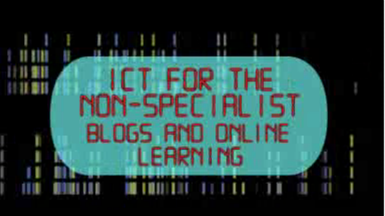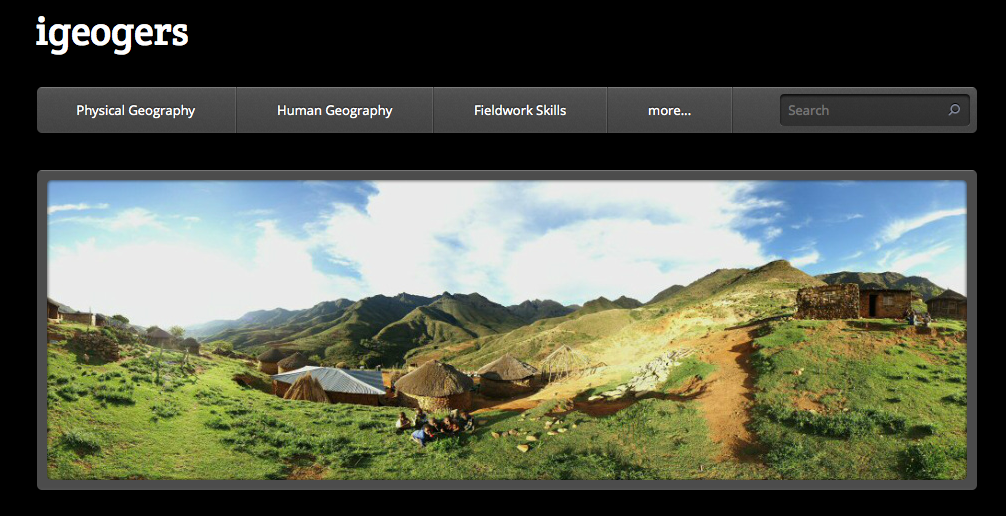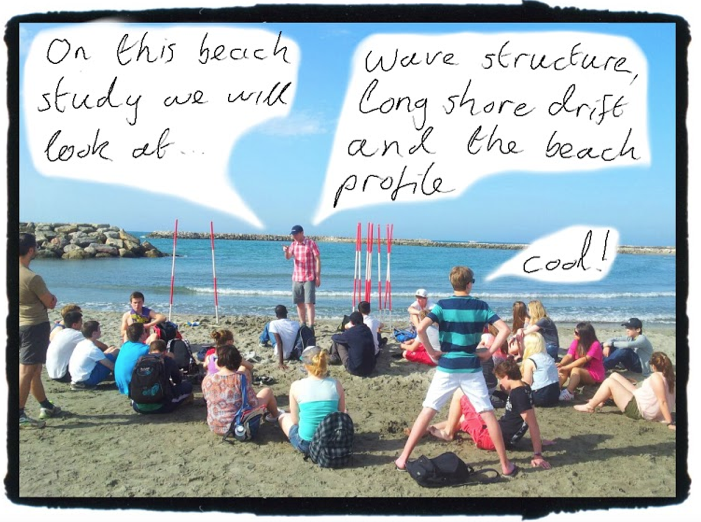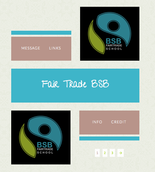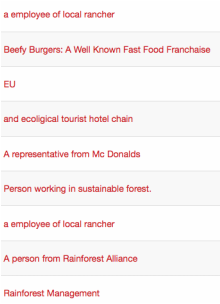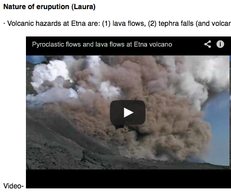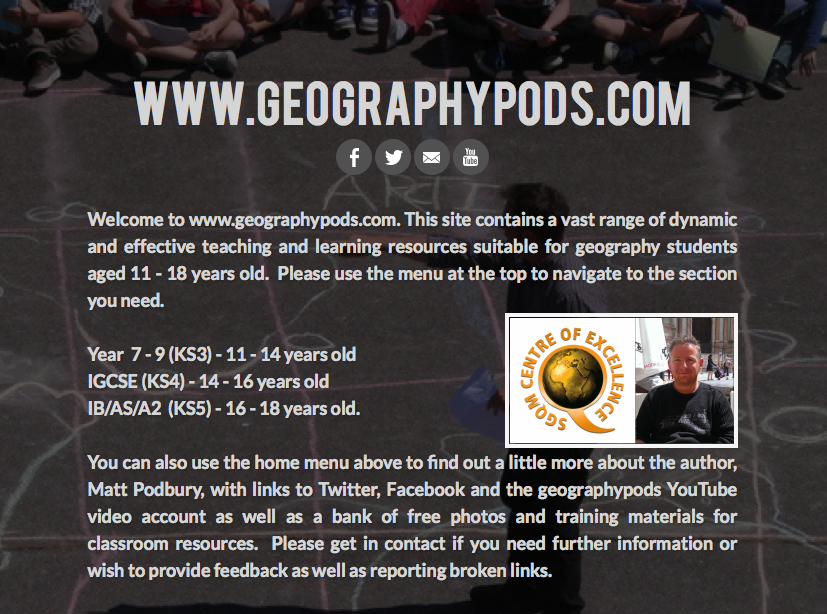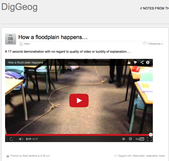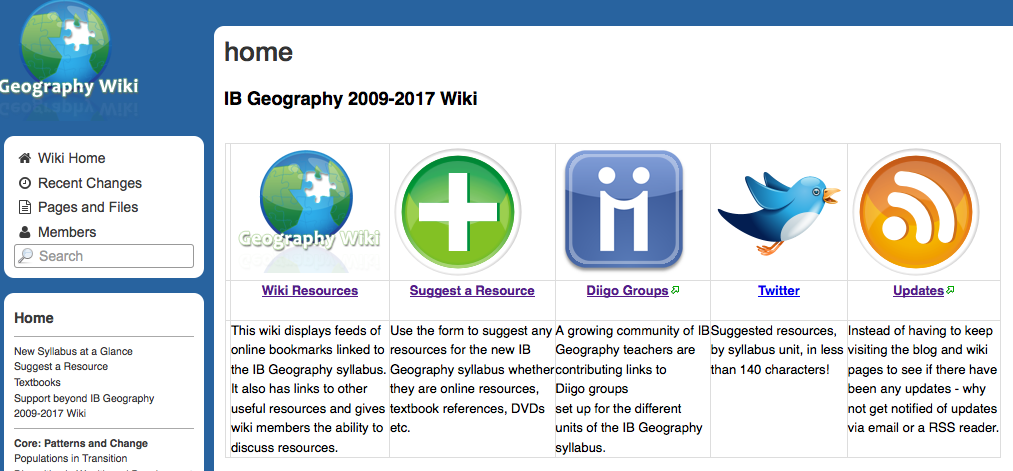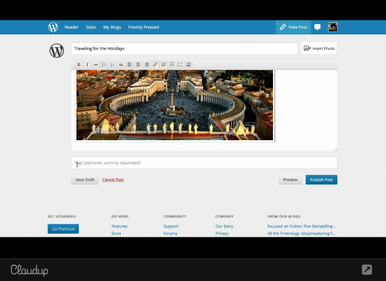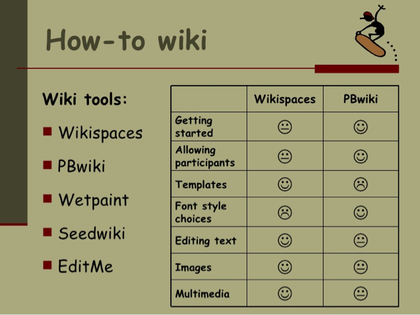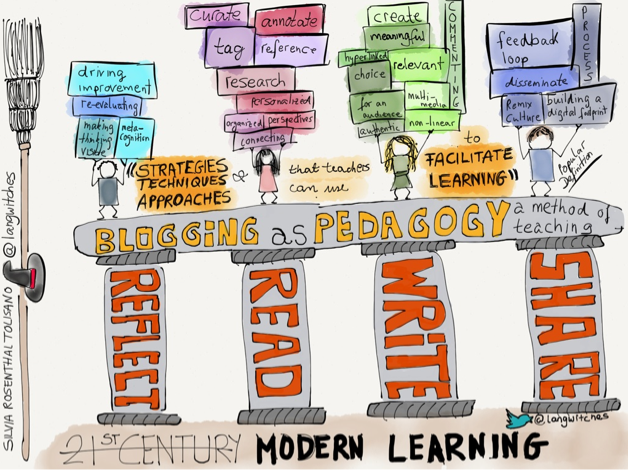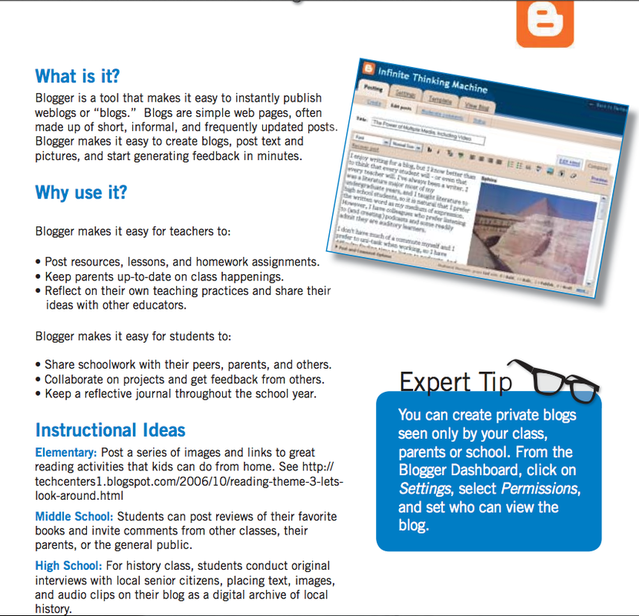There is enormous choice out there in terms of online technology tools. Each tool has an advantage in terms of its specialisation. As teachers we are time-scarce and therefore we need to make effective use of this specialisation. One product fits all just doesn't exist!
As teachers what are we looking for with our technology?
What kind of teacher are you?
How would you describe your pedagogy ?
How would you describe your pedagogy ?
- Effective pedagogy is student and learning centered and content/skills centered rather than technology centered.
- Don't adapt your pedagogy to suit the technolgy but rather incorporate the best of technology into your pedagogy.
- Empower yourself and your students rather than empower the technology. This way you expand the experience of both the student and teacher rather than reduce them.
How are some schools using blogs
The image below takes you to Teacher TV
How have I used Blogs and Wikis
|
Blogs for sharing course content
|
Blogs to extend fieldwork skills
|
|
Student blogs as collabrative presentation tools
|
Student forums for debate and wikis for collaborative research
|
External educational blogs
BLOGS
An online public diary for sharing information. Posts are uploaded as you write them and ordered chronologically. It allows for student comment.
An online public diary for sharing information. Posts are uploaded as you write them and ordered chronologically. It allows for student comment.
WIKIS
An online webpage which is quick and simple to write, can have multiple editors and timestamps each edit so you don't lose content.
E.g. Wikopedia, the community on mass editable encyclopedia
An online webpage which is quick and simple to write, can have multiple editors and timestamps each edit so you don't lose content.
E.g. Wikopedia, the community on mass editable encyclopedia
Wikispaces tutorials
|
|
|
|
Using Blogs and wikis in your classroom
Set up a teacher's class blog
- it serves as a focal point for writing exercises, models and prompts
- it communicates useful classroom information, announcements, online links and readings and exercises in one space
- it can include links to individual student blogs
- it contains useful student comment space for collaboration and peer review
Set up a class blog
- it unites all class announcements, assignments, and exercises in one space with the teacher as the operator of the site
- it provides a workspace for students to share thoughts, drafts, or projects in a relatively low-stakes environment•
- it provide a venue for quieter students to “speak” and contribute ideas
Set up individual student blogs
- they provide a workspace for assignments, brainstorming, process-oriented activities and questions of design and visual rhetoric
- they help students develop a sense of audience, voice and ownership
- they serve as an archive of the writing process by storing drafts and works in progress
- they display and publish final polished projects and new media projects
- they enable students to extend their thinking and research
The slideshow below feature blog lesson ideas taken from TeachersFirst
Using Wikis in the classroom
Wikis are an exceptionally useful tool for getting students more involved in curriculum. They’re often appealing and fun for students to use, while at the same time ideal for encouraging participation, collaboration, and interaction.
Resource Creation
Student Participation
Group Projects
Resource Creation
- Virtual field trips: Have your students research far away places they would like to go on a field trip, and get them to share images and information about the location.
- Create presenations: instead of using traditional presentation software, put presentations on a wiki, with use of multimedia
- Write a Wikibook: Make it a class project to collaboratively write a reference book that others can use.
- Study guides: Ask students to create study guides for a specific part of the unit you’re studying.
- Reader's guides: Have your students create readers’ guides to share their favorite and most important parts of works you’ve read in class.
- Solving wiki: Post difficult math problems, such as calculus, so that the class can collaboratively solve them.
- Gloassry: Get your class to create a glossary of terms they use and learn about in new units, adding definitions and images.
- Class Encyclopedia: Ask your class to create an "encyclopedia" on a topic, adding useful information that can be built upon through the years.
- Create exploratory projects: If you’re teaching a new subject, ask your students to collect and share information in the wiki so that you can learn together
Student Participation
- Exam review: Encourage students to share review notes and other helpful pieces of information on your classroom’s wiki.
- Peer review: Allow students to draft their papers in a wiki, then ask other students to comment it.
- Student portfolios: Assign portfolio pages to each of your students, and allow them to display and discuss their work.
- Correction competition: You can post a document riddled with mistakes, then have students compete to see who can fix the most errors fastest.
- Peer editing: Ask students to edit each others’ work for spelling, grammar, and facts based on a style guide or rules you’ve defined.
- Vocabulary lists: Encourage students to submit words that they had trouble with, along with a dictionary entry.
- Get feedback Ask students to post comments on wiki pages.
- Share notes: Let your students share their collective information so that everyone gets a better understanding of the subject.
Group Projects
- Group authoring: By asking groups to use central documents in a wiki, you can ensure that everyone’s documentation will be uniform.
- Organise ideas: Allow group members to post their ideas in a wiki, and you’ll cut down on duplicate ideas, while at the same time allowing them to build upon the ideas.
- Fan Clubs: Start fan clubs for your students’ favorite figures from history and ask them to contribute their favorite quotes, photos, and other tidbits together.
- Track Projects: With wikis, it’s easy for students to see which tasks have been completed and which ones still need to be fulfilled.
- Track participation: Assign a wiki page to a group project, and then individual pages for each student to show their participation.
Class Interaction
- Collect data: Use central documents to make sure that data collection is uniform and easy to manage.
- Mock Debate: Pit two class candidates against each other and perform a debate on your wiki.
- Study Buddy matches: Let students match themselves up into study buddy pairs.
- Multi-author story: Start a creative writing unit, and get your students to write a short story together, each writing a small amount of the story.
- Choose your own adeventure story A twist on the multi-author story could be a choose your own adventure story, where each student branches out into a different path.
- Share reviews Post articles for different movies, books, and TV shows, encouraging students to share what they though about them.
- Literature circles/article review Host a book club on your wiki where students are required to read the same book, then discuss it on the wiki.
For in the classroom
- Classroom FAQ: Make it a class project to create an FAQ for your classroom that will help new students and those that will come in years later.
- Classroom scrapbook: Share news, photos, and current achievements in your classroom on a wiki page.
- Classroom newspaper: Create your own news outlet on a wiki.
- Hall of fame: Highlight students’ exceptional achievements on the wiki.
- Classroom policies Encourage students to draft rules and policies for the classroom.
For the community
- School tour: Get your class to take photos of your school and write about their favorite spots on the wiki, then share it with the rest of your school and your local community.
- International sharing: Collaborate with a class from another country and share information about your culture, or even a day in the life of a typical student.
- Local History: Document historical buildings, events, and more from our community. You can ask students to perform interviews, and encourage parents and other adults to contribute their knowledge in the wiki.
- Community FAQ: Ask students to create an FAQ for their community, then pass it on to your next group of students.
- Community Nature Guide: Have your students collect highlights of plants and animals in your community.
- Celebrate achievements: Let parents log in to the wiki to see what their children have accomplished.






